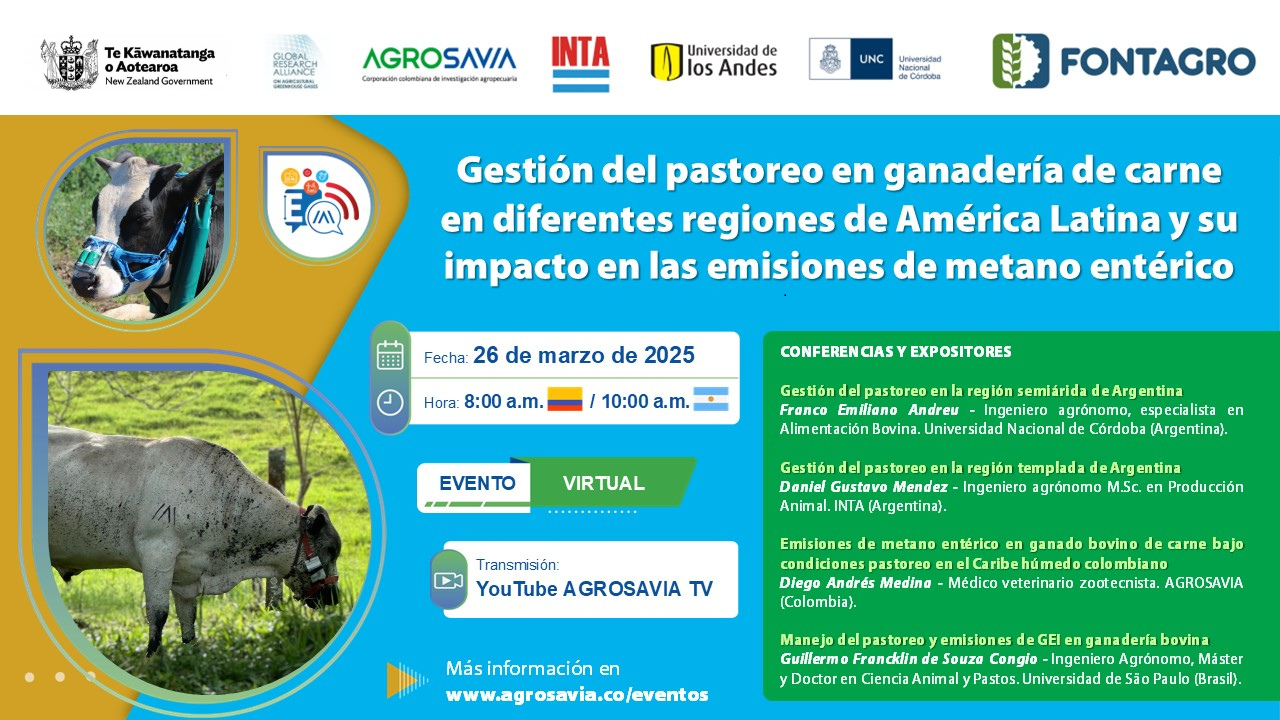As part of the project "Innovations to Reduce Methane Emissions in Ruminants," the international webinar "Grazing Management and Emission Mitigation Strategies in Cattle Farming in Latin America" ??was successfully held.

On March 26, 2025, as part of the FONTAGRO project “Innovations to Reduce Methane Emissions in Ruminants”—funded by the Government of New Zealand as part of its contribution to the Global Research Alliance on Agricultural Greenhouse Gases (GRA)—an international webinar titled “Grazing Management and Strategies to Mitigate Emissions in Cattle Farming in Latin America” was successfully held. The event was broadcast live on AGROSAVIA’s YouTube channel and simultaneously streamed on the YouTube channel of the Faculty of Agricultural Sciences at the National University of Córdoba (UNC), Argentina.
The event featured outstanding participation from specialists in Brazil, Argentina, and Colombia, who shared experiences on grazing management across various agroecological regions and its relationship with greenhouse gas (GHG) mitigation in livestock systems.
The webinar opened with remarks by Dr. Yury Tatiana Granja (AGROSAVIA), who provided context on the importance of the livestock sector in Latin America and the Caribbean, and the key role that knowledge dissemination plays in the adoption of sustainable technologies.
"In recent years, the livestock sector has experienced significant growth in response to the global increase in demand for animal products. According to the OECD-FAO Agricultural Outlook 2023–2032, global beef consumption is expected to grow by 10% by 2032. This scenario presents a major challenge for livestock production, as it may lead to increased GHG emissions to meet this demand. In this context, implementing innovative strategies to improve livestock productivity while reducing GHG emissions is essential. However, success in this process depends not only on the development of new technologies, but also on their proper dissemination, training, and transfer of knowledge to key stakeholders, including producers, technicians, academics, and policymakers.”
The first presentation was delivered by Franco Emiliano Andreu, a professor at the Faculty of Agricultural Sciences, National University of Córdoba, Argentina. He shared grazing management strategies in the semi-arid region and addressed a question from the audience about how to determine the recovery period in a natural grassland with many species.
Daniel Gustavo Méndez, National Coordinator of the Animal Nutrition Project and Head of Research at INTA EEA General Villegas (Argentina), then discussed grazing management in the temperate region of the country. He emphasized that "nutrition starts with grazing management," and elaborated on common challenges that producers face, such as visual estimation, mistaken harvest efficiency for utilization efficiency, the subjectivity of defining adequate residual biomass, and non-strategic supplementation due to a lack of knowledge of forage supply.
Next, Diego Andrés Medina presented results from AGROSAVIA in Colombia’s Caribbean region on enteric methane emissions from beef cattle under grazing conditions. Finally, Dr. Guillermo Francklin de Souza Congio, professor at the University of São Paulo (USP), Brazil, shared advances in grazing management and its impact on GHG emissions in Brazilian cattle farming. He highlighted promising results in improving productivity and emission intensity in pasture-based livestock systems through proper grazing practices.
The event was attended by over 180 people in real time, and is now available for viewing at the following link:
Webinar Recording on YouTube
This is the first in a series of webinars that will be held within the framework of the project to facilitate the exchange of experiences, collaborative reflection, and the development of sustainable solutions for the livestock sector.




